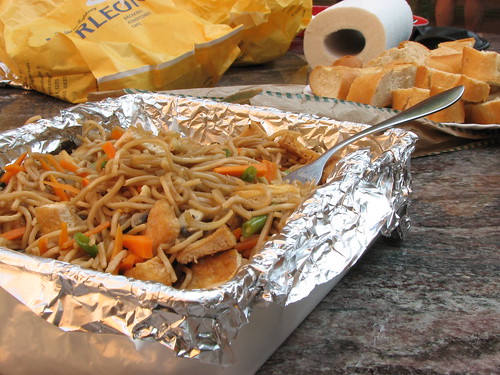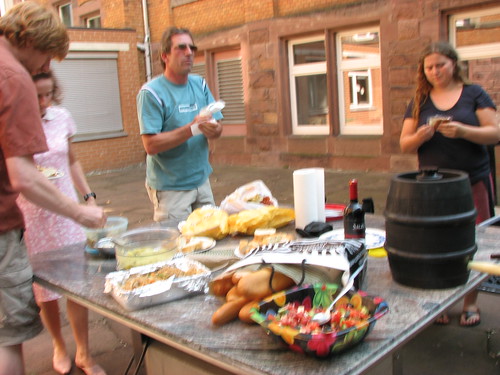 I flicked a question to twitter: will Germans eat noodles in a barbeque? Barbeques, or grills, as how they are popularly called here in Germany, are events held for meat-loving people. Somehow vegetarians are getting a bite of this occasion with grill-able vegie-meat, tofu, cheese and other meat-wannabe food variations. I got a reply some minutes later from Fabian Pattberg, a German twitter based in London. He said potatoes would be more like it. I started to ask myself if pledging to bring noodles, specifically pancit canton as how we call them back home, was a nice idea.
I flicked a question to twitter: will Germans eat noodles in a barbeque? Barbeques, or grills, as how they are popularly called here in Germany, are events held for meat-loving people. Somehow vegetarians are getting a bite of this occasion with grill-able vegie-meat, tofu, cheese and other meat-wannabe food variations. I got a reply some minutes later from Fabian Pattberg, a German twitter based in London. He said potatoes would be more like it. I started to ask myself if pledging to bring noodles, specifically pancit canton as how we call them back home, was a nice idea.
My only intention was to share my culinary and gastronomic culture, and add some variation to the slabs of meat and dumps of salads. We eat pancit in the afternoon for a light snack, or dinner, or heck, even for breakfast! I realized of its inappropriateness a few days earlier. Noodles on a grill in afternoon is like eating burgers with milk, putting sugar and hotdogs in spaghetti or eating warm rice for breakfast. How does stir-fried noodles fit in grilled lamb chops, bratwurst and turkey fillets? It didn't really matter much, I replied to my virtual feedback. I've almost got all the ingredients ready. Ahh, the ingredients. This is where the Asian shop by the main train station comes in handy. I marched to the Asian shop the other day. I didn't only buy the noodles and tofu. I also stocked on some canned laing (taro leaves in coconut milk) and instant pancit canton. The convenience of eating Filipino food in another land may not be the healthiest, but the joys of tasting something familiar and close to home outweigh the molecules of monosodium glutamate.
On my way back from the Asian shop, I imagined cooking the best Chinese noodles, not by a Chinese, but a Filipino. Maybe I can make an enterprise out of it, charge Germans a hefty sum some authentic Chinese, err, Filipino dish, and set up a restaurant that will raise the bar of Asian cuisine in Europe. It must be the humidity that brought these fantasies swirling in my head.
Yesterday morning, I made a couple of trips more to the corner grocery store, picked up an onion, a packet of beans and mushrooms, a bottle of sesame oil, and some kind of carrots called Möhren. I wonder what they are actually. They look like carrots, they taste like carrots, but they're called möhren.
The whole preparation and cooking time took almost an hour-and-a-half. The knife I used made the task doubly difficult as I julliened the Möhrens with what seemed to be a giant bread knife. It was like using a pair of scissors to cut a metal pipe. After the chopping, sauteeing, frying and stir-frying, all went well in the kitchen. I put the finished product in a plastic container lined with aluminum foil and covered it with the same, as a friend suggested. Now it's judgement time. I didn't actually taste it before I served it to the group, havíng no time do so and avoiding to realize the horror that I blasphemized a traditional Filipino-Chinese cuisine. I proudly carried it out of my dormitory, to the bus station, and in the institutions quarter, carefully holding the plastic container like a fragile glassware. My noodles stood out among bowls of salads and plate of bread. I let my co-workers be the judge of my first attempt to cooking pancit canton (vegetarian at that!) not only in Germany, but in my whole young culinary life. I generally got a good reception of my dish. "Your noodles with salad is really good!", said my boss. I let out a sigh, shrugged and told my seatmate that it's NOT salad, but vegetable garnish! She clarified to me that mixed vegetables in any form is considered salad in Germany.
My noodles stood out among bowls of salads and plate of bread. I let my co-workers be the judge of my first attempt to cooking pancit canton (vegetarian at that!) not only in Germany, but in my whole young culinary life. I generally got a good reception of my dish. "Your noodles with salad is really good!", said my boss. I let out a sigh, shrugged and told my seatmate that it's NOT salad, but vegetable garnish! She clarified to me that mixed vegetables in any form is considered salad in Germany.
After three hours of drinking, grilling, eating and talking, all that was left of my pancit was a plateful. I'd take that as a compliment.
Wednesday, July 30, 2008
Going Filipino on a German grill
Subscribe to:
Post Comments (Atom)





2 comments:
Just to clarify that point: "Möhre" is just a synomym for "Karotte" (as well as "Gelbe Rübe") (what is used depends on the region). So, they are carrots. (Oh, and by the way, bio- comes from "biologically grown", i.e. using no anorganic chemistry).
Hi Till,
Why don't they just call them all 'Karrotte(n)'? Anyhow, thanks for expanding my 'Wortschatz.'
Can BIO also mean 'biologically modified'? ;-)
Post a Comment